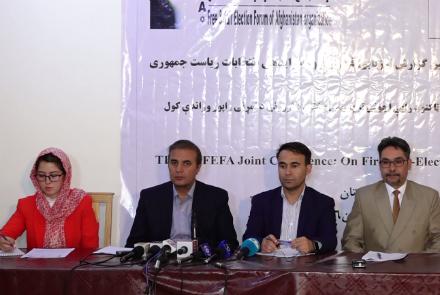A new study by two electoral monitoring organizations shows that the Independent Election Commission, the Afghan government and their international partners do not have a clear roadmap for peace and elections in the war-torn country.
The study notes that the election commission, the Afghan government and the international community are not prepared to hold a nationwide and transparent presidential election that will also see the end of President Ashraf Ghani’s five-year term.
The study indicates that the following issues have affected the interest of the Afghan government, the international community and the election commission to hold the upcoming presidential elections.
• Lack of interest from the international community towards the electoral process;
• The election commission’s “failure” to drop fake names from voter list;
• Ambiguity about the use of biometric devices in the elections;
• The nature of relations between the election commission and the government.
The study titled “The First Pre-Election Day Assessment Report” has been conducted by the Free and Fair Election Foundation of Afghanistan (FEFA) and Transparent Election Foundation of Afghanistan (TEFA).
“We need a roadmap whether it is peace or elections,” the CEO of TEFA, Yusuf Rasheed said. “We cannot move towards the elections with ambiguity.
The election is not a long-lasting process that you spent two years on it… It is clear we do not have anything for peace.”
“The government should halt interference and pave the way for monitoring. No institution is ready to support and monitor the elections,” head of TEFA, Naeem Ayubzada, said. “If we move towards the elections in such a situation, this would mean ‘electoral suicide’.”
The monitoring organizations have said in the study that some election campaigns have already started their bid for power-sharing.
“Election campaigns level some allegations from the address of women either for their own support or harming their rival campaigns,” the TEFA spokesperson Sughra Saadat said. “This harms women.”
“Our main concern was the budget which is settled now. Now with the support of God and the cooperation of donor institutions, we will conduct elections on sixth of Meezan [28 September],” the chairperson of the election commission, Hawa Alam Nuristani, said.
This comes a day after Chief Executive Abdullah Abdullah warned that the upcoming presidential elections should lead the country towards stability, not a crisis, as he stressed on transparency in the electoral process.
Abdullah warned that the country will fall into an “unbearable tragedy” if the problems of 2014 presidential elections were repeated in the upcoming polls, scheduled for September 28.
On Monday, the election commission issued credential letters to the presidential candidates with one of the candidates, Ghulam Farooq Nijrabi, refused to receive the letter, saying he will not trust transparency of the election process unless systematic reforms are brought in the election management body of the country.

